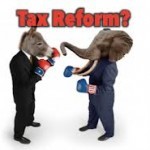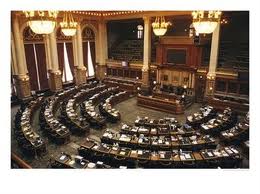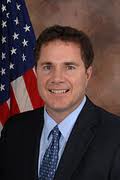
by | Apr 23, 2013
 Despite both Parties rhetoric to the contrary, I am hearing the chances of any significant Commercial Tax Reform in Iowa is dwindling.
Despite both Parties rhetoric to the contrary, I am hearing the chances of any significant Commercial Tax Reform in Iowa is dwindling.
Though legislation has passed each chamber, the Conference Committee tasked with finding a compromise both sides are comfortable with will struggle mightily. This is largely due to the fact that the structure for reforming the tax code that passed by each chamber are not compatible with each other. While Senate Democrats are insisting on a tax credit formula which businesses apply for and are granted, the House Republicans and the Governor want changes to the percentage assessed values are taxed at as well as lower caps on local property taxes.
I highly doubt that either side will give much on their chosen structure for reform, and it is hard to imagine a combination of these approaches being melded together without a confusing mess being created. Additionally, as desperate as Republicans are to deliver lower taxes to their constituents, there is a feeling in the caucus that passing a half-measure now will make it harder to re-visit the issue in future sessions to achieve their true goal. Conversely, Democrats would not mind getting their tax credit approached passed and fighting future battles with Republicans on increasing the value of the credits as they come up.
The Big Picture
After essentially controlling Iowa government for years with only a Senate majority, I don’t see anyway that House Republicans and Gov. Branstad can cave and allow Democrats to dictate the structure of tax reform–the one issue Republicans unquestionably own over Democrats.
As I’ve said here before, I do believe that Sen. Gronstal has a stronger hand than many realize. Much like the Fiscal Cliff debate late last year where Congressional Republicans were forced to give in, Iowa Republicans are in the same tough position of seeing taxes rise if nothing is done. This fact transfers a significant amount of leverage to Senate Democrats and Sen. Gronstal is operating accordingly. As long as Senate Democrats perceive they can hold a majority while taxes rise this is the posture that Republicans will face. Looking long term, if Republicans are unable to extract major compromises from Democrats in the conference Committee–which I don’t expect–I am comfortable with once again waiting on a bill altogether.
Though it will be harder than in 2012 and is far from a given, with Branstad on the ballot in 2014 there is a shot at winning the Senate and a likelihood of holding the House. If a bill was done with Republicans holding both chambers and the Governors office clearly the dollar amount and scope of tax relief be much larger. Perhaps more importantly there would also be a significant flat tax component and an opportunity to end the system of automatic future tax increases we have now. The leverage that would be gained in future partisan tax scuffles by doing so would be worth it’s weight in gold.
Research and House Majority Leader Statement
The main bill in focus can be read here (SF 295)…and by the way I dare anyone to read this bill and tell me we can’t find a better way to write tax policy. In contrast, here is the Dix/Whitver optional Flat Tax bill offered earlier this session (SF 443). Should this approach to our taxes be taken most citizens interaction with the tax code could be limited to lines 1-35 of this bill. A welcome thought to a large majority regardless of Party.
Below is the full release from House Majority Leader Linda Upmyer regarding this topic:
Delivering significant property tax relief to the hardworking taxpayers of Iowa has been one of our top priorities since gaining the Majority three years ago. Each year we have passed numerous proposals to the Senate, but unfortunately have not been able to reach a consensus. I am optimistic that this will be the year for true reform.
This week the House passed a comprehensive tax relief proposal that provides significant property tax relief across Iowa and helps reduce Iowans’ income taxes. The bill, SF 295, does not shift the tax burden between classes of property, but instead ensures that relief and reform is permanent, predictable, meaningful, and affects all classes of property. If no action is taken on property tax relief, Iowa’s taxpayers are staring down the barrel of a $2.6 billion property tax increase over the next 10 years, with the majority of that falling to homeowners.
Under our current state tax structure, residential property taxpayers pay approximately half of Iowa’s property taxes. While our proposal provides property tax relief across all classes of property, residential property taxpayers would benefit the most under this plan.
Currently, in terms of K-12 school funding, the state covers 87.5% of the school foundation formula. The remaining amount needed for our schools to operate falls on the backs of local property taxpayers. Our proposal increases the amount of state aid going to our schools and decreases the reliance on local property taxes. As a result, local property taxpayers will be protected from future tax increases.
Our proposal would also implement a 20 percent rollback of taxable value on commercial and industrial property, which would occur over a period of four years, at five percent each year. This would provide approximately $339 million in property tax relief when fully implemented. Additionally, our plan would include a standing unlimited appropriation to backfill lost revenue from the rollback to local governments.
As previously mentioned, the bill also aims to reduce Iowans’ income taxes by giving individuals a choice to file under the current system or to use a 4.5 percent flat tax option. This legislation makes Iowa’s tax system simpler, flatter, and fairer. Under this proposal, each taxpayer is given a choice that will enable them to do what makes the most sense for their own household budget.
Finally, our proposal would send dollars back to Iowa taxpayers that have been collected in the Taxpayer Trust Fund. Only after the Legislature and Governor have agreed to a final budget that meets the priorities of Iowans and funds the state’s obligations, any excess revenue would be returned to Iowa’s hardworking taxpayers.
SF 295 passed the House with bipartisan support and was sent back to the Senate for their consideration. We look forward to continuing this discussion, listening to all ideas and proposals, and are hopeful a resolution will soon be reached that provides much-needed and real tax relief to all Iowans.

by | Apr 16, 2013
 Question: What has happened so far at the Statehouse this session?
Question: What has happened so far at the Statehouse this session?
Answer: Mostly a whole lot of nothing.
With potentially as little as three weeks left before they gavel out this has been one of the most uneventful sessions since I began following them closely. There could still be some fireworks in store as the larger ticket items get discussed, but as it stands now nearly everything Governor Branstad has signed into law has been with near unanimous consent from both Parties. In fact, of the 36 bills he has signed so far most have been technical or clerical items passed with no dissent—and all but a couple have had no more than 3 no votes between the two chambers (notable exceptions being SF 184 and HF 160).
Conservatives Left with Little to Cheer About
The fact that divided government is not producing sweeping changes is hardly surprising, but getting no movement whatsoever on traditionally non-entrenched ideological issues is disheartening. For me personally these disappointments include the first funnel costing any chance of banning Automated Traffic Enforcement and the second funnel claiming the Voter ID bill. Both these issues have a clear majority of public support (Voter ID routinely gets well over 70% in public polls), and despite this couldn’t even receive the dignity of a vote.
Additionally, the Education Reform effort (yes, even the version the Republican House passed with no inter-Party dissent) is a “solution†few true Conservatives can embrace. Firstly, it is dumping $200 million more dollars into a system that already has received a 35.4% funding increase since 2002—with no discernible benefit in most districts. And secondly, the kind of actionable teacher evaluation, similar to what exists in the private sector, is nowhere to be found. Instead, in my view, what this reform offers is a largely a bunch of feel good jargon about “laddersâ€, “career pathwaysâ€, “mentorsâ€, and “master teachersâ€â€”now does that sound like a recipe for fixing a failing school?
In some way this issue has been absurdly overcomplicated, how about teachers just teach kids the information in their textbooks like miraculously you were able to do in the 1990’s and we’ll call it even. In fact, prove you can do so and we will give you a nice raise…you know the way it has worked for all the rest of us in the private sector since our birth.
While it is true that many strong home schooling amendments got passed by the House, A) the big ones won’t make it to the Governor’s desk, and B) even if they did it still wouldn’t make this effort worthwhile. And while there are a few bright spots (HF 625 which expands STO’s), there was no movement of Sen. Zaun’s proposal last session to give parents true schools choice, nor was there any effort made to ensure we have strict 3rd grade retention for reading proficiency.
Tax Reform the Big Prize…But Likely to Elude Again
Just like last session, there was talk by both sides at the beginning that something needed to get done here, but the writing is on the wall that it won’t.
Largely this is because the players and the policies they are pushing for are essentially unchanged from last year. Additionally I am starting to think that Sen. Gronstal knows he controls only one branch—but perhaps has the trump card in this standoff.
The way I have started to look at this is to see the similarities between this situation and the fiscal cliff scenario faced by Republicans on the Federal level at the end of last year. If you recall, Republicans were forced into caving because the specific position they were in—if no deal was struck taxes on everyone in the country would go up on January 1st. Similarly, here in Iowa if nothing gets done our tax rates will continue to climb—a reality that would surely bother Republicans more than Democrats. Not only does this give Gronstal more leverage in cutting a deal to avoid the tax hikes, if he can manage to stave off a deal until rates are raised he is in the position of deciding then who “deserves†tax cuts. As frustrating as this tactic is for Republicans, as long as high taxes don’t cost Democrats their majority it is truly brilliant politics.
The Truth As I see ItÂ
I would love to be able to say everything is looking up here in Iowa and nationwide, but the evidence disagrees. Coming off a brutal performance last November when Mitt Romney was unable to defeat a president with a terrible record and Republicans failed to take the Iowa Senate, we are now seeing the results. This legislative session is almost a mirror copy of the last and the chances of anything passing at all are slim–and unfortunately the chances of passing any significant Conservative policy is hopeless. Simply put, at the moment the landscape is virtually barren when it comes to potential political victories.
Elections indeed have consequences–and Conservatives are feeling them now. We must do better as a Party going forward–2014 awaits and brings another chance to make a profound and positive legislative impact.

by Art Smith | Apr 11, 2013
 In Iowa Politics this week on the Iowa Legislative Hour, hosts Kevin Hall and Art Smith (sans goatee and camera) talk with State House Representatives John Landon of Ankeny and Jake Highfill, along with State Senator Brad Zaun. Â Topics included the final confirmation votes for the Governor’s Regents Board Appointments, Property and Income Tax Reform, Health Care Reform, Education Reform, the likelihood of a short session, and much more.
In Iowa Politics this week on the Iowa Legislative Hour, hosts Kevin Hall and Art Smith (sans goatee and camera) talk with State House Representatives John Landon of Ankeny and Jake Highfill, along with State Senator Brad Zaun. Â Topics included the final confirmation votes for the Governor’s Regents Board Appointments, Property and Income Tax Reform, Health Care Reform, Education Reform, the likelihood of a short session, and much more.
If you enjoy watching this, think about watching (or just listening) LIVE on Thursday’s from 4:30 PM to 5:30 PM at Web Cast One Live! Â Your phone calls during the show are welcome if you have questions for our elected officials.
[wp-youtube-hd-large]MF3yQuqQk74[/wp-youtube-hd-large]

by | Apr 10, 2013
 Though it will fall short of the intense attention we receive during Presidential years, November 2014 in Iowa will develop into a fierce battleground for both political parties. In spite of the gubernatorial election on the ballot the prize for each side will be the open US Senate seat vacated by Tom Harkin.
Though it will fall short of the intense attention we receive during Presidential years, November 2014 in Iowa will develop into a fierce battleground for both political parties. In spite of the gubernatorial election on the ballot the prize for each side will be the open US Senate seat vacated by Tom Harkin.
While it is a virtual certainty that Bruce Braley will be the Democrat candidate in this race the Republican field is wide open, with no one yet confirming a run. As it stands now Rep. Steve King has been given the “first right of refusal†by fellow potential candidates Kim Reynolds and Bill Northey, and it is widely believed he will have decided by May 1st. One way or another, the field will become clear soon after. In the meantime, here is a first look at the dynamics if the matchup were King vs. Braley.
The Numbers
On last weekend’s Iowa Press Steve King referred to a Republican winning the seat as a “slightly uphill battleâ€â€”and the numbers indeed bear this out. Though they were highly inflated due to it being a Presidential election year, the cumulative votes cast last year in Iowa’s four Congressional districts reveal the Republican will be starting in an electoral hole. In total the four Congressional Democratic candidates (Braley, Loebsack, Boswell, and Vilsack) received 772,387 votes, while the four Republican candidates (Lange, Archer, Latham, and King) received 726,505 votes (D+45,882).
Obviously this is too broad a measure to be definitive but it does give a feel for the obstacles the Republican will face. Far more informative is looking at how Braley and King faired in their individual races. In this scenario the candidate and the electorate in their districts remain the same and the only variable that changes is the opponent. What the numbers show is that Bruce Braley is a better performing candidate than Steve King—something that will likely come as a surprise to many Republicans.
Last cycle Braley went in with a 25,420 voter registration advantage in HD 1 over Ben Lange but won by 59,957—beating the numbers by 34,537. Meanwhile King went in with a 50,396 voter registration advantage in HD 4 over Christie Vilsack but won by only 30,593 votes—losing the numbers by 19,803.
Yes Braley and Vilsack’s numbers were surely inflated due to Obama being on the ballot, and King and Lange were done no favors by Romney’s trouble with Independents, but there is still cause for concern. This is due to the fact that some of this inflated total was surely offset by King facing a far weaker opponent than Braley—Lange was a proven campaigner who came within 4,000 votes of beating Braley in 2010 while Vilsack proved to be an awful candidate who ran a terrible campaign.
These facts are certainly not to suggest a Republican cannot win the seat, they merely offer some context on the difficulties involved and likely explain the caution potential candidates are proceeding with.
Braley vs. King on Paper
The perplexing thing about this potential matchup is that on paper King is a far superior candidate to Braley. While King started an earth moving construction company from scratch, Braley is a trial lawyer and former head of the Iowa Trial Lawyers Association. Though it is true King has a visceral way of approaching issues and a knack for the ill-worded statement, Braley’s voting record reveals he is without a doubt a west-coast Liberal who just happens to reside in Iowa. In fact, besides voting with Democrats and Obama’s agenda 98% of the time in 2008, 99% in 2009, and 98% in 2010, since January 2007 he has voted 91% of the time with Nancy Pelosi. Among these votes of course are Cap & Trade, Dodd-Frank, Obamacare, and authorizing more than $6 trillion in debt over the last four years.
The number one objective for the campaign of whatever Republican takes on Braley will be getting the word out on his voting record. And if the above facts aren’t enough evidence of his poor decision making for Independents in Iowa—you can add he was one of the first to endorse fellow trial lawyer John Edwards for president in 2008.
My Take
In many Republican circles it has become a common belief that Steve King can’t win a statewide race—I do not concur. Perhaps I’d see more truth in this if the candidate on the other side was a moderate instead of one of the most Liberal politicians in the country—funny how we never hear Bruce Braley can’t win a statewide race.
That being said, I am of the belief that our strongest candidate by a longshot would be Kim Reynolds—and we would not risk a House seat in the process. While he would surely have a shot if he ran, undoubtedly the media would exclusively focus on King’s past statements and ignore Braley’s voting record.
In the end I predict that King will decide against running. Whether he proves me wrong or not, whoever takes up this task will have to run hard. Though this is a realistic opportunity for Republicans the numbers show that it indeed will be a “slightly uphill battleâ€.

by | Apr 8, 2013
 Proving his concern about our country’s national debt wasn’t mere campaign lip service, Congressman Tom Latham continued to warn against the perils of a $17 trillion debt in Urbandale on Friday. He joined an event hosted by the Iowa chapter of Fix The Debt and toured the facility of Jon Troen’s ColorFX company.
Proving his concern about our country’s national debt wasn’t mere campaign lip service, Congressman Tom Latham continued to warn against the perils of a $17 trillion debt in Urbandale on Friday. He joined an event hosted by the Iowa chapter of Fix The Debt and toured the facility of Jon Troen’s ColorFX company.
Speaking to a group of ColorFX employees Latham seemed hopeful a long-term solution could be agreed to this year saying, “I think there is a real chance of getting a bi-partisan deal passed. It has to be done to ensure our nation’s economic and fiscal security.â€Â As the owner of a company trying to navigate through an increasingly shaky economy, ColorFX owner Jon Troen fully concurred by stating, “The national debt affects everyone and it has a direct impact on how small business owners like me run and manage their operations.â€
Mr. Latham’s participation in these types of forums should be heartening to all Iowans, regardless of their political persuasion, who realize continued record deficit spending is fatal to our entire population. I have reported here before that a close look at Rep. Latham’s voting record the last several years reveals a rock-solid fiscal conservative unwilling to mortgage the future for temporary political gains. With so many politicians these days willing to speak one way around election time and then consistently vote the other way when the spotlight fades, Iowa is lucky to have someone willing to both speak out and vote for their convictions.
Below are some pictures from the event:



 Despite both Parties rhetoric to the contrary, I am hearing the chances of any significant Commercial Tax Reform in Iowa is dwindling.
Despite both Parties rhetoric to the contrary, I am hearing the chances of any significant Commercial Tax Reform in Iowa is dwindling.








